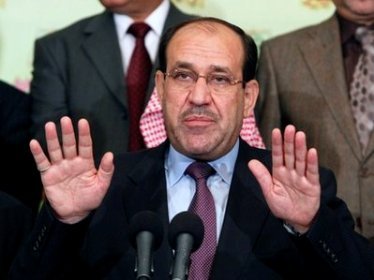Iraq PM to Alter Security Strategy as Violence Rages
إقرأ هذا الخبر بالعربية
Prime Minister Nuri al-Maliki said Monday he will overhaul Iraq's security strategy as a two-day wave of violence killed 72 people including 24 police, bringing the month's death toll from unrest to 349.
"We are about to make changes in the high and middle positions of those responsible for security, and the security strategy," Maliki said at a news conference in Baghdad.
"We will discuss this matter in the cabinet session tomorrow (Tuesday) to take decisions," Maliki said, without providing further details.
"I assure the Iraqi people that they (militants) will not be able to return us to the sectarian conflict" that killed tens of thousands of people in Iraq in past years, he added.
A car bomb exploded in Shaab, a Shiite area in north Baghdad, at around the time Maliki spoke, killing 12 people and wounding at least 20, officials said -- just the latest in a wave of bombings on Monday.
Two car bombs went off in the main southern port city of Basra, killing 13 people and wounding 48, while a wave of other bombings hit Baghdad, killing at least 11 people and wounding 102.
In Balad, north of the capital, a car bomb exploded near a bus carrying Iranian pilgrims, killing eight people and wounding at least 15.
Iraq is home to some of the holiest sites in Shiite Islam and is visited by hundreds of thousands of foreign pilgrims every year, most of them from neighboring Iran.
Three Sahwa anti-al-Qaida fighters were killed and 14 wounded in two separate attacks north of Baghdad, and a roadside bomb in the northern city of Mosul wounded three people.
Monday's violence comes after 24 police were killed overnight.
Police Lieutenant Colonel Majid al-Jlaybawi said police and soldiers carried out a joint raid to free kidnapped police officers in Anbar province, west of Baghdad, but clashes ensued.
Twelve kidnapped policemen were killed and four wounded, although it was not immediately clear if they were caught in crossfire, killed by their abductors, or a combination of the two.
Mohammed Hadi, one of the wounded policemen, told Agence France Presse they had been abducted on the highway between Baghdad and Jordan on Saturday.
In Haditha, a town in Anbar province, gunmen attacked a police station, killing eight police, among them two officers, First Lieutenant Murad al-Hadithi and a doctor said.
And gunmen killed four police and wounded three in an attack on another police station in the town of Rawa, also in Anbar, said Qais al-Rawi, head of the area's local council.
Gunmen also killed a shop owner in Mosul on Sunday.
The security situation in Anbar, home to two of the main centers of Sunni anti-government protests that broke out almost five months ago, has deteriorated sharply.
On Saturday, security forces tried to arrest Mohammed Khamis Abu Risha, who is wanted in connection with the killing of five Iraqi soldiers near Ramadi, west of the capital.
But the bid arrest Abu Risha, nephew of a powerful tribal sheikh who is a key supporter of Sunni anti-government protesters in Anbar, sparked clashes with tribesmen in which two of them were killed.
Hundreds of gunmen then gathered in the area of the Anbar Operations Command headquarters near Ramadi, but later withdrew, police said.
Officials also reported kidnappings of people including security forces in Anbar on Saturday, though they gave differing figures for how many were seized.
Tensions are festering between the government of Maliki, a Shiite, and Sunnis who accuse authorities of marginalizing and targeting their community, including through wrongful detentions and accusations of involvement in terrorism.
While the government has made some concessions aimed at placating the protesters and Iraqi Sunnis in general, such as freeing prisoners and raising the salaries of Sunni anti-al-Qaida fighters, underlying issues have yet to be addressed.



